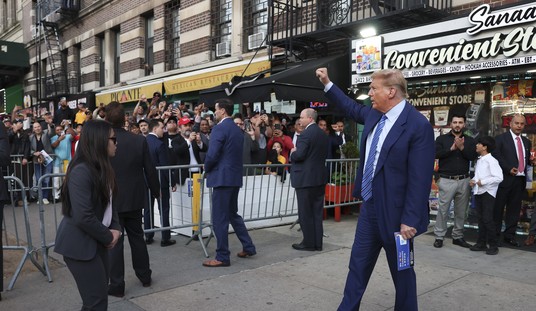[jwplayer config=”pjmedia_richardfernandez” mediaid=”30488″]
The Bradley Manning decision is due out soon. He may or may not walk, depending on how the court rules. But politicians can leak secrets too — and walk — as history shows.
“Andrew Jackson May (June 24, 1875 – September 6, 1959) was a Kentucky attorney and influential New Deal-era politician, best known for his chairmanship of the House Military Affairs Committee during World War II, and his subsequent conviction for bribery. May was a Democratic member of United States House of Representatives from Kentucky during the Seventy-second to Seventy-ninth sessions of Congress.”
Historian Clay Blair claimed that May was responsible for a major release of highly confidential military information during World War II, known as the May Incident. In that incident, U.S. submarines had been conducting a successful undersea war against Japanese shipping during World War II, frequently escaping Japanese anti-submarine depth charge attacks. However, the deficiencies of Japanese depth-charge tactics were revealed in a press conference held in June 1943 by Congressman May on his return from a war zone junket. At this press conference, May revealed the highly sensitive fact that American submarines had a high survival rate because Japanese depth charges were typically fuzed to explode at too shallow a depth. Various press associations sent this leaked news story over their wires and many newspapers (including one in Honolulu, Hawaii), published it.
It was subsequently discovered that Japanese naval antisubmarine forces were adjusting their depth charges to explode at a deeper depth. Vice Admiral Charles A. Lockwood, commander of the U.S. submarine fleet in the Pacific, later estimated that May’s security breach cost the United States Navy as many as ten submarines and 800 crewmen killed in action, stating “I hear Congressman May said the (Japanese) depth charges are not set deep enough. He would be pleased to know (they) set them deeper now.” A report from the U.S. Navy’s Pacific Submarine Fleet determined that Japanese ASW forces failed to uncover the maximum test depth ability of U.S. fleet submarines during the war. However, the report made no finding as to whether Japanese ASW forces altered their depth charge attacks to deeper settings as a consequence of May’s revelation to the press.
Ten subs on Eternal Patrol may have been sent to the bottom by Congressman May. The original Bungo Pete. But he was an ally of Roosevelt’s. Maybe even helped him win World War 2. Perhaps in the calculus of history May’s political cooperation with FDR was worth more than the submarines lost. Maybe. Just don’t ask the men who went to the bottom of the sea.
It’s little realized the press keeps secrets whose confidence they feel entitled to protect. The Associated Press, for example, was outraged when Eric Holder wiretapped them in its attempts to plug a leak. One man’s leak is another man’s betrayed secret. When the press leaks confidential cables it is called “investigative journalism”. But when the FBI tries to find out how a journalist gets his secrets that is called suppression. The New York Times describes the current court wrangle over a reporter’s right to keep secrets in pursuit of a story.
WASHINGTON — In a major ruling on press freedoms, a divided federal appeals court on Friday ruled that James Risen, an author and a reporter for The New York Times, must testify in the criminal trial of a former Central Intelligence Agency official charged with providing him with classified information.
In a 118-page set of opinions, two members of a three-judge panel for the United States Court of Appeals for the Fourth Circuit, in Richmond, Va., ruled that the First Amendment does not protect reporters who receive unauthorized leaks from being forced to testify against the people suspected of leaking to them. A district court judge who had ruled in Mr. Risen’s case had said that it did.
“Clearly, Risen’s direct, firsthand account of the criminal conduct indicted by the grand jury cannot be obtained by alternative means, as Risen is without dispute the only witness who can offer this critical testimony,” wrote Chief Judge William Byrd Traxler Jr., who was joined by Judge Albert Diaz in Friday’s ruling.
It’s a perfect symmetry. The government wants to keep its information classified. Risen wants to keep his informant’s name classified. Too bad they can’t both have their cake and eat it.
Risen’s sources would of course be “chilled” by the knowledge that their identities are to be revealed. Doubtless the confidential sources which Manning disclosed are likewise chilled, or at least fear being chilled to room temperature, by their publication. Maybe Manning didn’t mean it. Neither did May mean any harm. It was just one of those things.
Information can heal or it can kill; it can be as beneficial as medicine or as lethal as a bullet. Whenever you decide to keep a secret or reveal it creates a risk. Take the case of Operation Red Wing. A group of SEALs was inserted behind Taliban lines to stalk the enemy. Just as they dug in a bunch of goatherds happened by. They let them go.
After moving to a pre-determined, covered overwatch position, from which the SEALs could observe the Named Areas of Interest, the team was discovered by local goatherders. After determining that they were civilians, and not combatants, Lieutenant Murphy had them released, as was protocol in the area of operations at the time, according to rules of engagement. Within two hours of letting the goatherders go, the SEAL Reconnaissance and Surveillance team was ambushed by Shah’s men, a group estimated to number anywhere from eight to 100-plus men.
The goatherds probably went straight to the Taliban. What would the UN say? “Of course you must let them go.” Sure. But I wonder whether the UN would stick around to find out what was coming next. Letting them go is analogous to taking the risk of not keeping operational security absolute. The SEALs decided to accept the risk of not keeping a secret in exchange for the moral benefit of not killing goatherders. Only one of them survived. They bought the ticket, they took the ride.
Keeping secrets has a cost. Likewise exposing them has a cost. Interrogating prisoners has a cost. Not interrogating prisoners has a cost. The whole problem of politics and warfare — indeed of living in this world — is largely a question of who gets left holding the bag. It helps to realize there’s no free lunch. Alas that’s not self-evident to everybody. But ultimately someone pays the bill.
The question is who.
Many well intentioned and idealistic people believe they can come away from their activities absolutely cleanly. “No I never did nothing wrong. No not me.” Well one likes it to be that way. Perhaps Manning thought his leak would be a sword of fire to slash away the curtain of darkness. And doubtless he succeeded to some extent. But swords almost always draw blood. That’s just how it works.
If Manning was prepared to go to jail to make his point then he saw the price and paid it. It must have crossed the minds of those SEALs that their decision could be very expensive. Sometimes you’re willing to spin the wheel. In this case somebody else besides Manning will probably make the money on the book deal; someone else will play him in the mini-series and the actual Manning himself will find himself experiencing unpleasantness to a greater or lesser degree.
You wonder about the world somtimes. The difficulty in squaring the circles in this life is probably one of the main reasons many people believe in God. We leave the scene in an unsatisfactorily untidy condition. And it’s natural to want an overtime period to fix things. There are too many loose ends in life and so few happily ever afters.
[jwplayer config=”pjmedia_richardfernandez” mediaid=”30503″]
Did you know that you can purchase some of these books and pamphlets by Richard Fernandez and share them with you friends? They will receive a link in their email and it will automatically give them access to a Kindle reader on their smartphone, computer or even as a web-readable document.
The War of the Words for $3.99, Understanding the crisis of the early 21st century in terms of information corruption in the financial, security and political spheres
Rebranding Christianity for $3.99, or why the truth shall make you free
The Three Conjectures at Amazon Kindle for $1.99, reflections on terrorism and the nuclear age
Storming the Castle at Amazon Kindle for $3.99, why government should get small
No Way In at Amazon Kindle $8.95, print $9.99
Storm Over the South China Sea $0.99, how China is restarting history in the Pacific
Tip Jar or Subscribe or Unsubscribe









Join the conversation as a VIP Member